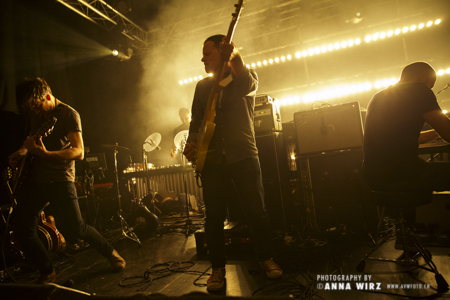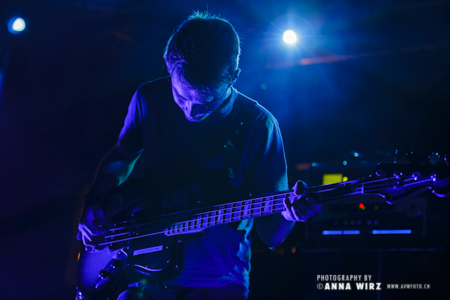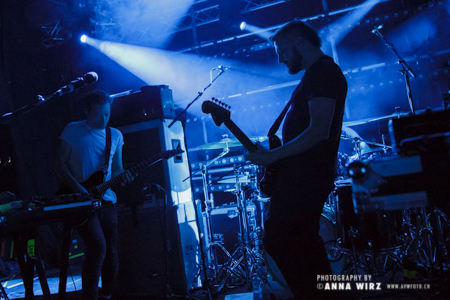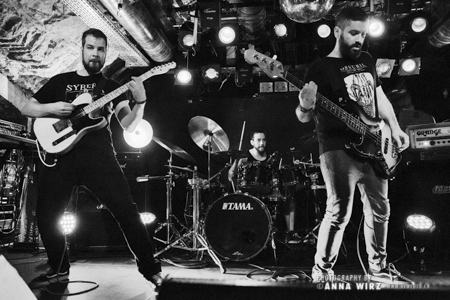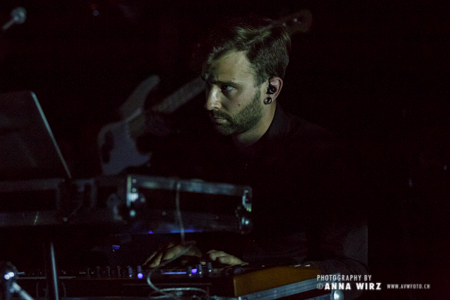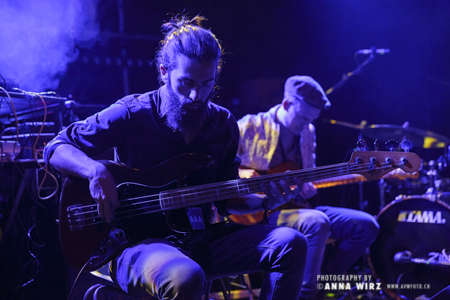Small is Beautiful - Bergmal Post-Rock Festival 2016

So what is Post-rock?
Post-rock is an enigmatic genre. Since the term was supposedly coined by Simon Reynolds in a review of Bark Psychosis' seminal 1994 album Hex, the label has been rejected by many bands and musicians who prefer to see their music as simply 'experimental' or perhaps a variation on a more established genre like metal.
It's undeniable, however, that post rock has a certain style about it, albeit vague - whether in the vast apocalyptic soundscapes of Godspeed You! Black Emperor, strewn with audio clips of bleak quotations and Linklater-esque dialogue but otherwise void of lyrics, or in the bittersweet nostalgia that permeates Mogwai's (occasionally) more traditional song structures; but once again, with that droning post-rock flavour.
Mono is one of Japan's answers to the genre, often mixing these two emotions to great effect, achieving music cinematic in scale but with a broken heart at the centre.
With the emergence of Bergmal, Switzerland’s very first dedicated post-rock festival, it’s clear that for such an obscure and vaguely defined (people playing guitars in unusual ways?) sub-genre of even the alternative music scene, it is still internationally recognisable and appreciated, from its origins in the UK, through Europe from West to East, all the way to Japan and eventually back home via the USA (Boston's Caspian and Austin's Explosions in the Sky). It shows that music is a universal language, even down to the most seldom spoken dialects.
Bergmal Festival
The sheer variety of post-rock was well demonstrated last Saturday night at Bergmal, with acts ranged from the “post-rock pale ale”, those who took the lighter side of a dark genre, possibly dabbling in a stronger electronic element; through those who wallowed in the bleak despair of a droning, metal-inspired offering; and finally to those who were clearly there to have a great time blowing the roof off the house with simply epic music.
Taking place at the Dynamo building, within walking distance of Zürich's Hauptbahnhof, and across three stages, roughly dividing the varied styles of the bands playing, the music ranged from gloomy to blistering, mellow to epic, and all around experimental, resonating off the walls of the indoor venue.
Although the sun was still high in the afternoon sky, upon entering the venue, night fell instantly. Undeniably a niche event, those passionate folk who had in fact heard of the genre slowly filled the spaces available, as the evening of layered drones and textured guitar soundscapes built until, by the time Cataya were playing in the cellar stage after 8 p.m., those who weren't there early enough had to make do standing in the stone archway catching glimpses of looped black-and-white projections of birds and forests while the endless sound screamed down the tunnel, giving a very literal new meaning to "underground music".
The Bergmal Bands
The evening began with a definitive introduction to the off-beat and intense rhythms of math-rock by the Spanish offering, Jardin de la Croix, who played in the cellar stage at the suitably industrial riverside venue. As the volume was turned up on the shuddering bass synthesisers, the cosy curved stone tunnel that comprised the stage and standing area filled with a rumbling akin to standing inside a rocket's exhaust at Cape Canaveral before take-off. Shifting rhythms and time signatures typical of math-oriented bands were on full display here.
Next up, the roof stage's first performance was by one of the many local Swiss bands on show, Shriduna. With hints at a driving American countryside feel, their more intense moments could earn them the description of a sort of Math-Zep, if you will. Combining classic hard rock rhythms with ethereal, almost Pink Floyd-esque breaks within their tracks, Shriduna perhaps only faltered in knowing how to end a song, often resorting to simply ceasing to play.
Like Wrexham's Gallops, Flieder has taken a much more electronic-inspired approach to the post-rock genre. Heavy bass-line synthesisers shook the slow, melting trip-hop beats into reverse gear as the mandatory reverb-laden guitar verified the post-rock stamp. Another feature common among the cinematically-inclined purveyors of this brand of music, projection was also effectively used by Flieder.
Back downstairs on the cellar stage, the sudden inclusion of lyrics by Death of a Cheerleader at an an otherwise almost purely-instrumental festival was a bit of a shock to the system, inevitably feeling a little self-conscious amongst the swathe of confident yet disguising walls of sound the other bands built around them.
With all the mentions of the name “Jake” in the rooms of the Dynamo that evening, it becomes clear that if any one individual deserves specific recognition when discussing this festival, it's Jake Gutzwiller, lead guitarist of Glaston and most importantly, the man behind the festival's existence.
In amongst running around equipped with walkie-talkie and stage blacks managing the show, he somehow found time to pull off a spectacularly dynamic performance with his band, conjuring the mellow emotion of Mono’s music, greatly aided by Selina Maisch’s part-Glass, part-Oldfield arpeggiated keyboard playing. Travelling the waves from mellow to intense, Glaston’s music conjured feelings of nostalgia like a passionate memory, never fully joyful nor laden with depression, it encapsulated that peculiar emotional core of post-rock, of a bittersweet joy or an epic sadness; a reflection of the unavoidable complexity of relationships and experiences, without a clear cut monotonous feeling in any situation. How this comes across in purely instrumental form is naturally indescribable, and only through common experience can it be communicated.
For a conclusion in true post-rock fashion, Gutzwiller chose to wield a cello bow to play on his archtop guitar, a technique also used by Radiohead’s Johnny Greenwood, and finished the set on a buildup of massive scale, drawing great admiration from the cheering crowd as the final note rung out.
Dirty Purple Turtle. Quite dirty, rather purple, definitely turtle. You have to admire anyone that can scream the lyrics "twenty-one seconds" over and over, presumably for twenty-one seconds, into a heavily distorted vocoder as his drumming partner puts a beat to his mad thrashing of the various dials and buttons on the vast electronic control panel in front of him.
Taking a few hints from Godspeed You! Black Emperor's stage presence, Cataya (from Aachen, Germany) effectively used European analogues of the Canadian outfit's bleak midwest American landscapes populated with lone telephone poles that so often comprise their faded film-esque projections. The Germans treated the packed-in crowd at the cellar stage to visions of birds emigrating at a seasonal change, and lonesome forests rushing past on a cold winter's drive through the mountains. This was a perfect fit for the harsh yet emotional walls of textured sound that emanated from the band's no less than four guitars, sustained and layered to the n-th degree, and together with ever onwards-driving percussion achieving a sense of scale closer to that of (perhaps the reference band, given it's so often mentioned) Godspeed than most at the festival. Basically if you like the Canadians' more intense stuff, you should like these guys.
The highlight of the evening, at least for this reviewer, was the privileged experience of one of Zofingen-based Leech's rare resurfacings on the live stage. Technically complex and flawless, with dynamics to rival the best of the genre, Leech proved that if Germany can stake the claim of having the European Godspeed, Switzerland has its own Mogwai, though in fact it may be grossly unfair to compare them to anyone, despite the potentially familiar warbled Rhodes electric piano and glockenspiel.
The usually reclusive studio-focused band took the roof stage and lifted it right off, transporting all the wide eyes and nodding heads to another plane of existence with ever-building progressions without resolution, using off-notes and jaunted beats to great effect, proving that to have a satisfying, nay epic, conclusion, you need to work for it. Rather than overly rely on drones and repetition, Leech demonstrated a great affinity for applying melodies and dynamics more akin to the progressive-rock and krautrock origins of the post-rock genre, with vast synthesisers building 1970s science fiction landscapes permeated by complex bass lines and ever-rising lead guitar lines.
Most of their album tracks don't fall under at least six minutes in length, with many over ten, and some of these were indeed on full display that night. It's very well possible that they only played a total of three tracks in their one-hour set, and with a continuous sound at all times, even in transitions to new songs, it must be considered a wholly single (and singular) experience. Simply put, seeing a live rendition of “Hands Full of Hearts, Heart Full of Head” is something everyone should be given the chance to witness.
After several sleepless nights touring Europe, Max Lewis, one half of the US-based ambient trip-hop duo Arms and Sleepers, found himself in Bergmal’s electronica room as a one-man show, explaining the political influences on his music and his disillusionment with the current state of American politics to a small crowd of fans, gathered around like school friends at Lewis’ house party. With a tongue-in-cheek complaint about a lack of support crew (explaining from around a dark corner “I’m sure 65daysofstatic have five thousand crew members and I’m here having to press play on my own visuals” before re-emerging to take control of his instruments), and his face lit by the glow of various drum machine controllers and futuristic-looking touchpads, he launched into a mad melange of trip-hop beats, chopped and screwed samples, and (once again) wonderful projections featuring VHS-era visual effects, plenty of vector computer graphics filtered through hazy analogue distortion, as his fingers danced across the controls, matching the motions of those that surrounded him on all sides, letting loose with their best moves. Keeping the tone casual, he would ask between tracks if “it all sounds okay?” while making sure people felt invited to stand as close as they like to his electronic canvas.
As the night came closer to its conclusion, a remarkably heavy bass synth, possibly topping an already packed list of heavy bass synth lines for the evening, filtered through the ceiling of the electronica stage, likely to Max Lewis’ great chagrin, from the UK’s heavily electronic outfit 65daysofstatic playing on the roof stage. Coming right off their recent work on the soundtrack for the video game No Man’s Sky, the appropriately vast scale of this headlining act’s sound was a suitable final crescendo for the Bergmal festival.
As one of the lead musicians of the band slowly raised his arms from his sides as if to part the electro-acoustic seas, the bass that shook the nation would build and build, almost wiping from memory any delicate guitar plucking from earlier in the evening. With what occasionally borders on a form of math-pop, the dance-style synthesised sound that 65daysofstatic brought to Zürich never abandoned the sheer scale that seems to be a common factor for all who associate themselves with post-rock.
And so...
Post-rock may still be an underground and largely unheard of style of experimental music, but since its beginnings in the late 80s to early 90s, it has maintained a passionate audience and if anything is growing in popularity alongside the resurgence of longer-format psychedelic music making a comeback together with the vinyl format thought to be long gone.
This interest in music from the latter half of the 20th century has thankfully allowed people like Jake Gutzwiller and the whole community to organise events and festivals like the one Zürich saw this weekend, and while post-rock may still be an anglo-centric genre, springing primarily from the UK and USA, the rather large influence from 1970s progressive-rock and krautrock, squeezed through a grungy 1990s pedalboard, show that it's not entirely illogical to consider the mainland European adoption of post-rock as an experimental genre coming home to its roots, and Switzerland’s Bergmal Festival was as good a place as any to demonstrate this niche but passionate and growing interest.
The advantages of a smaller festival, belonging to such a smaller music scene with fewer crowds and next to no stadium-scale events, can be truly felt in an experience like last Saturday night. Those who come together, artists and fans alike, are truly passionate about what they do and whom they support, even down to the details, such as Glaston’s drummer sporting an Agent Fresco t-shirt.
Where else can you have an audience member hi-five and chat to the lead guitarist of a band right after finishing their set? Where else can you rub shoulders with the festival organiser as he stands in to watch a lone experimental DJ address a roomful of people as a group of friends? Where else can those who make and love experimental music and audiovisuals in general meet and celebrate their passion?
At small festivals, that’s where; and that’s why small is beautiful.
- Miles Prinzen
[Sadly, three of the bands playing on Saturday were unable to be seen at all by this reviewer due to timetable conflicts. These were Besides, Rome in Reverse, and EF.]
More photos by Anna Wirz on Flickr.



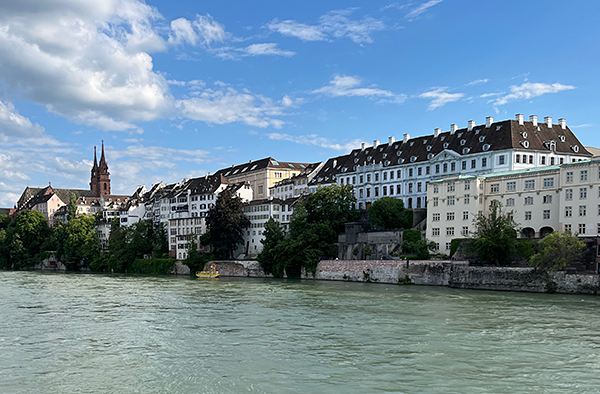 Ajita Chowhan from
Ajita Chowhan from 